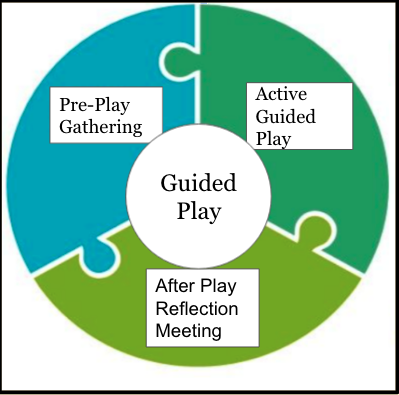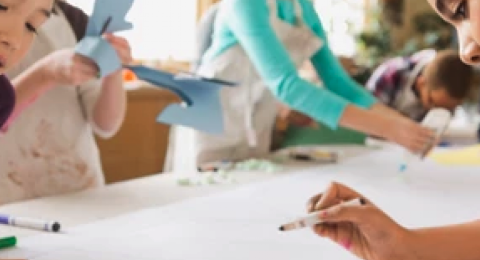
The UNH Early Learning Coaching Team developed this framework to support teachers in effectively implementing guided play in their classrooms, structured around three essential components:
- Pre-Play Gathering
- Active Guided Play
- After Play Reflection Meeting
- During guided play, the teacher assumes the role of an intentional planner, observer, active play participant, researcher, and documentarian. When preparing for guided play experiences, the teacher intentionally plans invitations within the environment, essentially setting the stage for meaningful and imaginative interactions.
- The teacher selects materials and their arrangements with intention; drawing upon children's interests, inspiring their curiosity and creativity, and encouraging them to explore. Though the teacher may anticipate the types of interactions that will take place between children and materials and between children with other children, the children always take the lead during guided play. It is the children who decide how they will explore and interact with the materials. As children respond to the teacher's intentional invitations for play, the teacher assumes the role of an active participant engaging alongside children. The teacher follows the child's lead while assuming the role of a researcher.
- Teachers thoughtfully observe children's play and extend their thinking and learning through the use of open-ended questioning and scaffolding techniques. As teachers make observations about individual students' developmental needs and learning styles, play is used as a vehicle to help children make connections and to transfer their knowledge and skills across content areas through natural and meaningful integration.
- Teachers document evidence of their students' learning through play by taking photographs and videos, scribing their imaginative stories, and asking children to revisit and retell their experiences. While this documentation serves as evidence of student learning, it also encourages teachers to engage more deeply in reflective practice. Through observation and documentation, teachers gather information about each child and develop a better understanding of their strengths, challenges, interests, and approaches to learning. As a result, teachers are able to effectively plan environments that offer rich and meaningful learning opportunities for each child.
As Facilitators of guided play experiences, teachers/adults:
- Intentionally plan meaningful play-based learning opportunities
- Create opportunities to support collaboration and inquiry while learning alongside students and co-constructing knowledge.
- Actively observe children engaged in play and respond to children’s ideas, inquiries, and paths of interest.
- Engage in responsive dialogue with children as they explore.
- Model and promote positive social and emotional skills
- Ask open-ended questions to deepen students’ thinking and extend their learning.
- Document children's learning and experiences using photographs, video, and scribing children's thoughts/ideas
- Use information gathered in observations to inform the planning of future play-based experiences.
- Scaffold students' learning by creating a responsive environment and providing sensitive feedback and questions as children engage in playful learning opportunities
- Engage children in decision-making and reflection related to the community and their learning.
Learn More About the Guided Play Framework and Coaching Opportunities
Karen DuBois-Garofalo, M.Ed.
Lead Early Learning Coach & Coordinator
University of New Hampshire
9 Madbury Road
Durham, NH 03824
karen.dubois-garofalo@unh.edu
Learn More About Play-based Learning Initiatives and Research
Kimberly Turner Nesbitt, Ph.D.
Associate Professor
Department of Human Development and Family Studies
University of New Hampshire
217 Pettee Hall
kimberly.nesbitt@unh.edu
